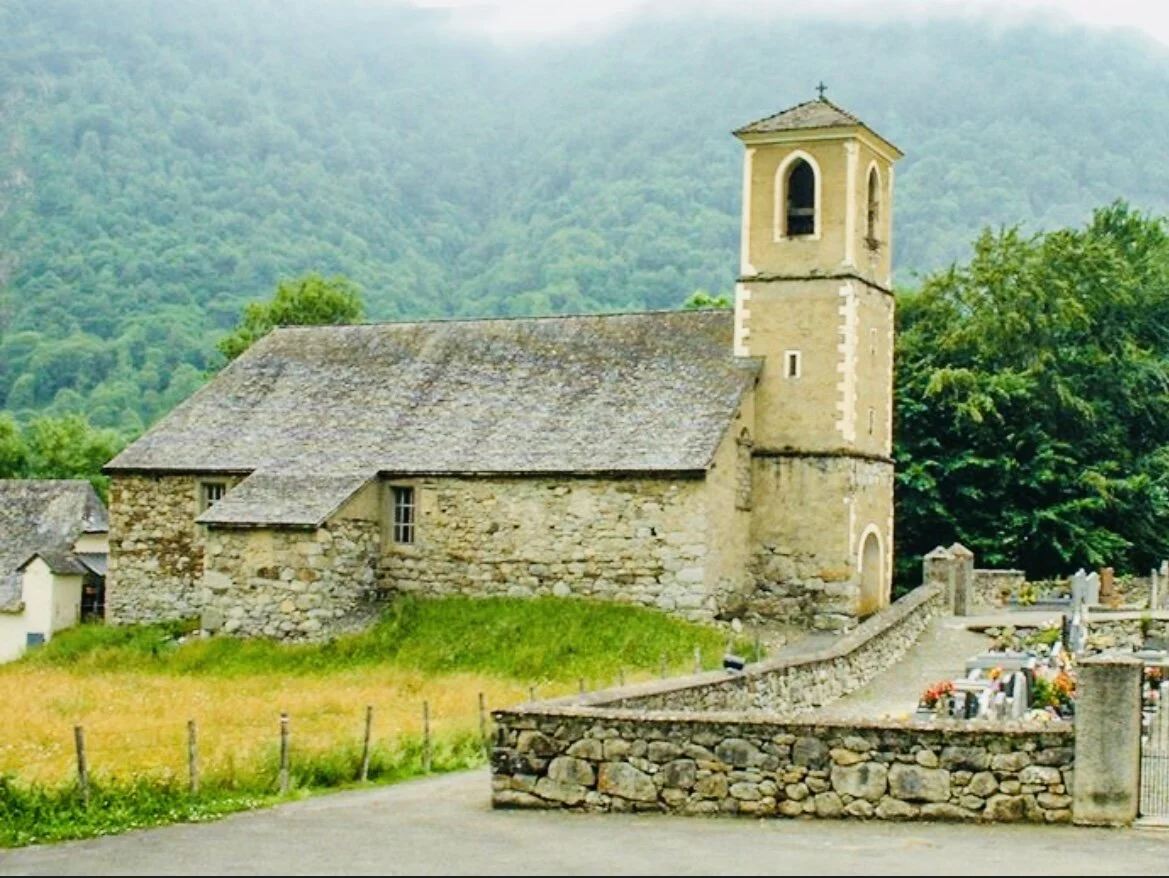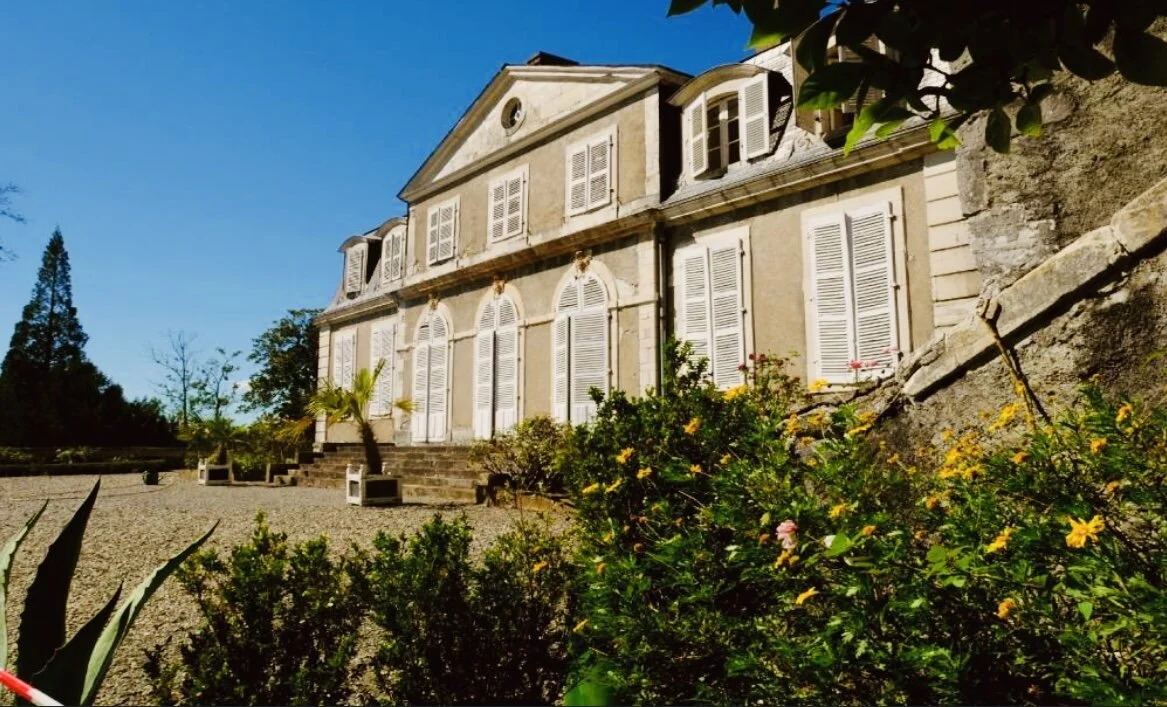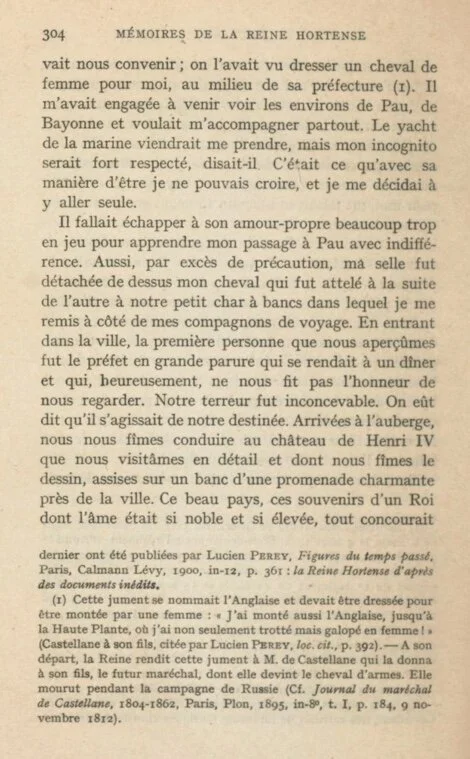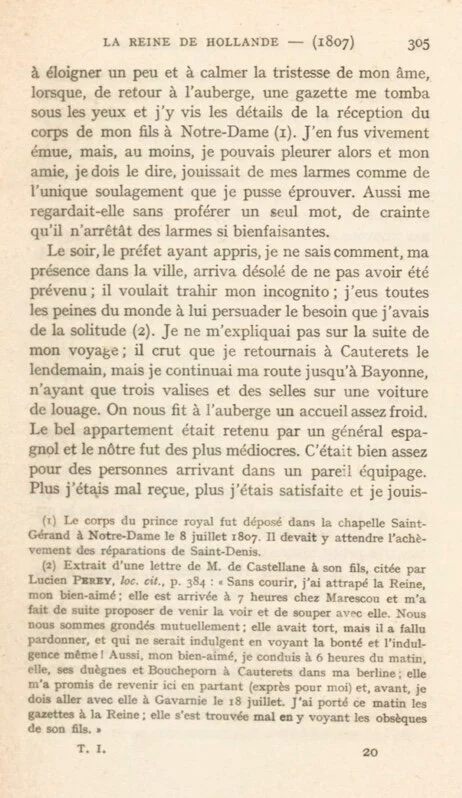Let’s have another look at Hortense’s Memoirs. If you want to read the book it is available for free at the side bar in English and French. Use the widget on the sidebar to translate the text below into pretty much any language.
Hortense relates how oppressive she found the royal station that had been placed on her and how she sought some freedom.
Hortense’s memoirs continues:
The idea of going out into society was intensely disagreeable to me, and I decided instead to make a little trip as far as the Spanish border since it was so near. As I enjoyed traveling incognito, in order to be able to do as I pleased, I left Cauterets on horseback in the direction of a distant valley.
My only companions were Madame de Broc, Monsieur de Boucheporn, an elderly man who was governor of the palace, and a mounted servant who carried our provisions. Having visited the delightful valley of Azun, at one end of which is situated a chapel that much to the regret of the peasants had been closed for a long while and which I managed to have reopened in memory of my son, I began my journey toward Spain instead of returning to Cauterets.
My first night was to be spent at Lourdes. On arriving near the town, I made a detour and entered by the Porte de Paris in order that no one might suspect I was coming from Cauterets. While supper was being prepared, I went for a walk with Madame de Broc.
Many of the townspeople were sitting outside their doors. I joined one such group, was offered a chair and found myself taking part in the conversation.
After asking many questions as to where I came from and where I was going, my neighbors began talking of the Queen of Holland, who was taking the waters at Cauterets. They spoke favorably of her, and I was pleased at hearing myself praised by these good folk who thought I was many miles away.
The next morning, I set out for the charming city of Pau. We left all our riding-horses at Lourdes with the exception of mine. This horse was attached to a small cart which we hired and which my courier drove. The bumping of this badly hung vehicle gave me a rather violent pain in my chest. I had my horse saddled and remounted, riding behind the wagonette in which Madame de Broc had remained.
Occasionally I would stop on purpose to lose sight of it. For the first time in my life I thus found myself alone on a highway. What was there to remind me of the fact that I was a queen, a queen with courtiers, a queen whom people envied no doubt and yet who was so unhappy? I forgot all this. For a moment I made myself believe that freed from all the bondage of my station I was traveling as I pleased.
For an instant I felt that I had laid aside the crown and with it my troubles and my sorrows. I breathed the pure, clear air with an intense enjoyment, and when the carriage stopped to wait for me I galloped up to it in order to reassure my traveling companions and beg them not to worry about my safety. Then once more I would remain alone in order to dream of peace and liberty.
A young peasant woman, clad in the becoming costume of the country and riding on a donkey, was taking the same route we were. She and I rode along side by side chatting with one another. She was on her way to market. Her talk was all about matters which seemed important to her. The more ordinary and commonplace these matters were the more I enjoyed hearing about them. I tried to catch her point of view completely.
Our inner sorrows instead of limiting the circle of our sympathies develop them and cause us to take a more active and compassionate interest in what goes on about us. We stopped at the abbey of Betharam, and Adele and I made a sketch of it. We lunched quietly beside the dashing stream. Afterwards I visited the castle of Coarraze, famous as the place where Henry IV spent his childhood.
These excursions took my mind off my troubles. I felt that I was living on another planet. This method of traveling, which was so new to me, caused me to forget for a moment my sorrows. As we neared Pau, I feared that the sight of a woman riding astride might attract too much attention in a provincial town and I was not at all anxious to be recognized by the prefet, the Marquis de Castellane.
The latter was a clever man but lacked tact and would have been extremely vexed at the idea that I was in his department without his having been informed of the fact. His memories of the former days at court made him believe himself still irresistible.
Although far from young he retained the weaknesses and pretentiousness of youth and thought he had also preserved its charms. I had received the prefet at Cauterets. He was delighted with our household. Surrounded by five young ladies, he had displayed all his airs and graces, and imagined himself fascinating when he was merely being ridiculous.
We had only desired to be left alone to avoid attracting attention. Instead, the prefet had made us conspicuous by spending his time in the main streets of his capital specially training a horse for me to ride. He had urged me to visit the surroundings of Pau and intended to accompany me everywhere.
The yacht belonging to the fleet would come for me, but my incognito, he declared, would be respected. In view of the way he behaved this seemed very doubtful, and I determined to make my excursions alone. In order to do so I had to take pains to avoid a wound to his sensibilities, which would have been keen had he learned that I was at Pau.
Consequently, by an excess of precaution my horse was unsaddled and attached to the back of our carriage in which I sat beside my companions. As we entered the city, the first person we caught sight of was the prefet in full regalia on his way to attend a dinner. Fortunately, he did not deign to notice us. Our terror was inexpressible. On arriving at the inn, we asked for a guide to take us through the château of Henry IV. Afterwards, sitting on a bench in the delightful park close to the city, we made a sketch of the building. This lovely landscape, the memories of this monarch whose soul was so noble and generous had combined slightly to dissipate and calm my grief. But on our return to the inn I picked up a
a newspaper. It contained an account of the reception of my son's body at Notre Dame I was deeply moved, but at least now I was able to weep. My friend, I may add, was glad to see my tears, the only way in which I could relieve my feelings.
Consequently, she watched me without saying a word for fear of checking their beneficent flow. That evening the prefet, having learned in some manner which I cannot explain that I was in the city, called, deeply grieved at not having been notified in advance, and wished me to lay aside my incognito.
The original French is available below:










